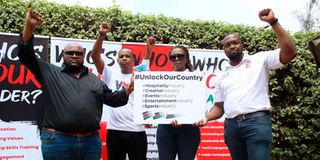Lobby group asks state to unlock economy by lifting partial lockdown

From left Members of the #UnlockOurCountry movement sports industry chairperson Francis Ngaitho, entertainment industry chairperson Davidson Ngibuini (DNG), hospitality industry's Noni Mwangi and event organizer Frank Weya when they released a statement on the loss of jobs facing their members in the hospitality, entertainment and creative industry since the announcement of partial lockdown in five counties in Kenya to curb the spread of Covid-19.
What you need to know:
- One Voice One People criticised the government for failing to cushion the Kenyan workforce affected by the recent measures.
- The lobby group also wants the National Police Service stops assaulting and extorting those who violate the curfew rules.
President Uhuru Kenyatta is facing increased pressure from the public to ease the partial lockdown he recently imposed in five counties to curb the spread of Covid-19
Speaking at a press briefing in Nairobi on Tuesday, a lobby group known as the One Voice One People criticised the government for failing to cushion the Kenyan workforce and the business community affected by the recent measures.
This group, mainly consisting of stakeholders from hospitality, sports, and entertainment industries, explained that thousands of Kenyans have lost their jobs and livelihoods and the government is not offering solutions.
"The effects of locking down the economy are worse than the spread of the virus. So we are not asking for any favour or handouts, we just want to do what we know. What we have been doing for a long time," said media personality Davidson Ngibuni.

From left Members of the #UnlockOurCountry movement sports industry chairperson Francis Ngaitho, entertainment industry chairperson Davidson Ngibuini (DNG), hospitality industry's Noni Mwangi and event organizer Frank Weya when they released a statement on the loss of jobs facing their members in the hospitality, entertainment and creative industry since the announcement of partial lockdown in five counties in Kenya to curb the spread of Covid-19.
Francis Gaitho, another member of the lobby group, blamed politicians, whom he termed as the super spreaders of the virus.
"As the rest of Kenyans complied with earlier measures to tame the spread of the virus, politicians hosted super spreader events and escalated an already bad situation. Vaccines which arrived in Kenya from the Covax facility meant to be administered for free, are being hoarded and in many cases, reportedly sold by corrupt health officials," said hospitality consultant Noni Mwangi.
President Kenyatta's directives
The lobby group also wants the National Police Service stops assaulting and extorting those who violate the curfew rules plus the urgent review of the energy and fuel prices.
During his address to the nation last month, President Kenyatta put Nairobi, Kajiado, Machakos, Kiambu and Nakuru counties under partial lockdown, as part of new Covid-19 containment measures.
President Kenyatta also directed cessation of movement by road, rail and air into and out of the five counties until further notice.
The head of state further ordered for the closure of all bars operating in those five counties which he declared "disease infested area" following a surge in Covid-19 infections. Restaurants in these counties were ordered to only serve food to customers on a take-away basis.
Covid-19 infections and deaths
Also affected was the sports industry following a presidential directive suspending all sporting activities in a raft of measures that have left thousands of people jobless.
Football Kenya Federation (FKF) and the Kenya Rugby Union (KRU) have separately asked the government to rescind their decision, indicating that thousands of players, most of them the youth, have been left jobless.
The President's directives come as Kenya registered a sharp increase in Covid-19 infections and deaths in February and March.




